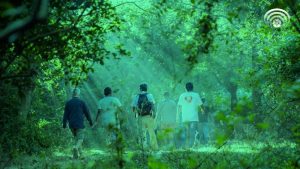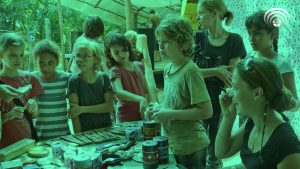The concept of a sharing economy, where resources and skills are shared within a community, has been gaining momentum worldwide as a response to the environmental challenges posed by excessive consumption and waste. In Auroville, however, the sharing economy is not a trendy buzzword but an integral part of daily life. Established in 1968, this unique township, envisioned by the Mother and founded by Mirra Alfassa, popularly known as the Mother, promotes a sustainable and holistic way of living, and the sharing economy plays a pivotal role in realizing this vision.
The Essence of Auroville: Auroville is often referred to as the “City of Dawn,” a place where people from all walks of life and corners of the world come together to live harmoniously and work towards a common goal – human unity. This aspiration for unity naturally extends to the way resources and assets are shared within the community.
Collaborative Living in Auroville: Collaborative living is a core tenet of Auroville’s philosophy. In Auroville, residents live in various settlements and neighborhoods that are designed to foster community living. These living arrangements range from individual homes to shared living spaces, and the concept of private ownership takes a backseat to the principle of communal well-being. Residents here share everything from vehicles and tools to common facilities such as kitchens and gardens.
Resource Sharing in Auroville: One of the most striking features of Auroville’s sharing economy is the sharing of resources. Residents commonly use a system of “resource units” to keep track of their contributions and usage of community resources. This system ensures that everyone has access to the resources they need while also encouraging a sense of responsibility and accountability.
For example, Auroville has a fleet of shared bicycles available for residents to use. These bicycles are maintained collectively, and anyone can use them for their daily commuting needs. This sharing of bicycles not only reduces the environmental impact of individual car ownership but also promotes physical well-being and a sense of interconnectedness among the residents.
The Role of Work and Services: The sharing economy in Auroville extends beyond just physical resources. The community also emphasizes the sharing of skills and services. People contribute their expertise, whether it’s in agriculture, construction, education, or healing, for the collective benefit of the community. There are numerous workshops and vocational training programs that help individuals develop skills and share them with others, ensuring self-sufficiency and a well-rounded community.
Sustainable Simplicity: Auroville’s sharing economy is deeply intertwined with the pursuit of sustainable simplicity. The community promotes sustainable practices such as organic farming, renewable energy, and zero-waste living. By sharing resources and services, Auroville significantly reduces its ecological footprint. For instance, residents collectively manage organic farms, minimizing the need for harmful pesticides and chemical fertilizers. The focus on renewable energy sources like solar power and wind turbines also aligns with Auroville’s commitment to sustainability.
Moreover, the principle of sustainable simplicity extends to daily life in Auroville. Residents are encouraged to live modestly and reduce their consumption, emphasizing the value of experiences over material possessions. The practice of sharing assets ensures that people are not burdened by excessive belongings, contributing to a sense of mental and emotional freedom.
Community Building Through Sharing: Auroville’s sharing economy plays a vital role in building a strong sense of community. By sharing resources and services, residents form deep connections and trust with one another. These shared experiences create a bond that goes beyond mere transactional relationships, fostering a genuine sense of belonging.
The communal kitchens, where residents often come together to prepare and share meals, are prime examples of this communal spirit. This practice promotes social cohesion, creating a unique and enriching atmosphere that transcends the superficial boundaries of modern urban living.
Challenges and Adaptation: The implementation of a sharing economy in Auroville is not without its challenges. It demands a high level of cooperation, organization, and a shared vision. The community continually adapts to meet the evolving needs of its residents while preserving the essence of collaboration and sustainability.
Inspiration for the World: The sharing economy in Auroville serves as an inspiring model for the world. It demonstrates that it is possible to lead a fulfilling, sustainable, and harmonious life without the excesses and waste commonly associated with modern living. The township’s commitment to unity, simplicity, and sustainable living offers a blueprint for a more balanced and equitable society, addressing the pressing global issues of environmental degradation and resource depletion.
Conclusion: Auroville’s unique experiment in collaborative living and its successful application of a sharing economy serve as a beacon of hope in our challenging times. The township’s commitment to sustainable simplicity, community building, and responsible resource sharing offers valuable lessons and inspiration to the world at large. Auroville is a testament to the idea that when people come together with a shared vision, they can create a sustainable, harmonious, and joyful way of life that fosters the well-being of both individuals and the planet. As the world grapples with complex environmental issues and the pursuit of a more balanced and equitable future, the lessons from Auroville’s sharing economy can serve as a guiding light towards a better tomorrow.



